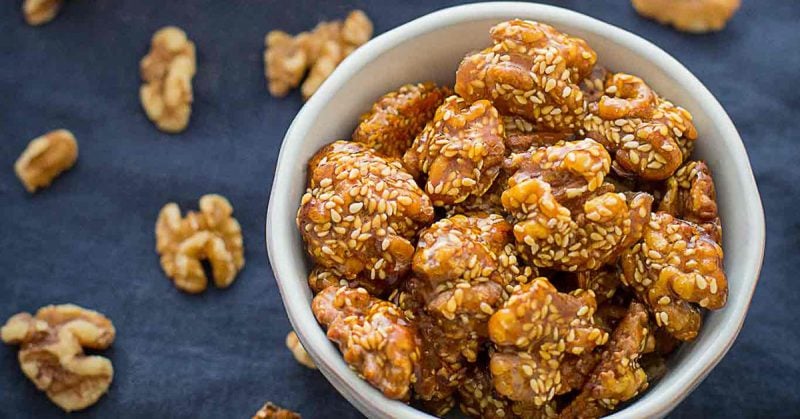Did you know that the liver is the most important “chemical factory” in our body? It not only helps filter blood and detoxify, but also plays a crucial role in digestion and nutrient metabolism. However, modern lifestyles, including unhealthy diets, prolonged stress, and environmental pollution, have led to a rise in liver-related issues such as fatty liver, hepatitis, and even cirrhosis. Fortunately, certain natural foods rich in nutrients can help support liver health and improve overall well-being. One such superfood is walnut – a small but mighty nut packed with surprising benefits.
Walnuts – A Nutritional Powerhouse
Walnuts are beloved not only for their unique flavor but also for their exceptional nutritional profile. They are an excellent source of omega-3 fatty acids, antioxidants, vitamin E, vitamin B6, magnesium, copper, and phosphorus. Notably, walnuts contain up to 15 times more omega-3 than salmon, which helps reduce inflammation and protects the cardiovascular, neurological, and liver systems.
Scientific research has unveiled the positive impact of walnut consumption on multiple organ systems in the body. In addition to liver protection, walnuts enhance brain function, support sleep, and maintain heart health. A 2020 study published in the American Journal of Clinical Nutrition revealed that regular walnut intake reduces the risk of non-alcoholic fatty liver disease (NAFLD).

Walnuts for Liver Health
Protecting the Liver from Within
The liver is constantly exposed to harmful factors from the environment and unhealthy lifestyle choices. Fortunately, walnuts are rich in antioxidants such as vitamin E, polyphenols, and ellagic acid, which help neutralize free radicals, reduce oxidative stress, and protect liver cells from damage. Walnuts also help regulate blood sugar levels and lower the risk of fatty liver.
Dr. Nguyen Thi Minh Nguyet, a nutrition expert at the National Institute of Nutrition, shares her insights: “Incorporating walnuts into your daily diet can help lower triglyceride cholesterol and improve liver function by regulating insulin levels.”
Boosting Cardiovascular Health
One of the standout benefits of walnuts is their ability to lower bad cholesterol (LDL) and increase good cholesterol (HDL). According to a study published in the British Medical Journal, regular walnut consumption reduces the risk of atherosclerosis, the primary cause of cardiovascular diseases.
Enhancing Brain Function
Walnuts have earned the nickname “brain food” due to their abundant omega-3 and antioxidant content. Omega-3 not only improves memory and concentration but also safeguards against neurodegenerative diseases like Alzheimer’s. Associate Professor Dr. Le Thi Ha, a neurologist at Bach Mai Hospital, emphasizes the importance of omega-3 in walnuts: “Omega-3 plays a crucial role in maintaining the structure of neuronal cell membranes and promoting brain metabolism.”
Promoting Restful Sleep
Interestingly, walnuts contain melatonin, a natural hormone that regulates sleep. A study published in the Journal of Nutrition found that consuming walnuts before bedtime can enhance sleep quality and leave you feeling more refreshed upon waking.

Maximizing the Benefits of Walnuts
To reap the full benefits of walnuts, opt for fresh, non-moldy nuts without a rancid oil smell. Store walnuts in a cool, dry place or in the refrigerator to maintain their freshness. It is recommended to consume 3-5 walnuts per day, depending on your needs and health status.
Beyond snacking, walnuts can be added to yogurt, salads, cereals, or used in baking and plant-based milk. A word of caution: individuals with nut allergies should exercise caution when consuming walnuts.
Other Liver-Friendly Nuts
In addition to walnuts, consider incorporating other nut varieties into your diet, such as almonds, which are rich in vitamin E, or cashews, which are high in fiber and magnesium. Sunflower seeds, abundant in vitamin E and selenium, are another excellent choice. Including a variety of nuts in your diet ensures a balanced and nutrient-dense approach to liver health.
Healthy Diet and Lifestyle for Liver Wellness
To maintain a healthy liver, it’s essential to adopt a wholesome lifestyle. In addition to incorporating walnuts into your diet:
- Limit your intake of alcohol, tobacco, and other intoxicants.
- Consume plenty of green vegetables and fiber-rich fruits.
- Stay hydrated by drinking sufficient water to aid the liver’s detoxification process.
- Engage in regular exercise to boost metabolism.
- Undergo regular health check-ups to detect any potential liver issues early on.
Conclusion
Walnuts are not just delicious; they are a potent ally in liver health and overall wellness. With their impressive nutritional profile and scientific backing, walnuts deserve a prominent place in your health regimen. Start incorporating walnuts into your daily routine today, along with a balanced diet and healthy lifestyle, to achieve optimal health and vitality. Remember, your health is your greatest asset – cherish it!





































